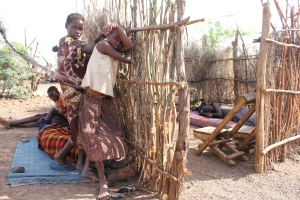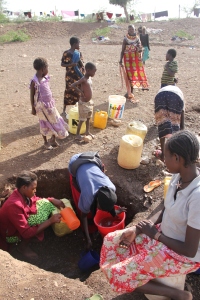With the greater influx of a predominantly refugee population in Kakuma, the numbers of Internally Displaced Persons (IDPs) lack attention from their own government.
In the outskirts of Kakuma Township live more than 400 Kenyan households who fled ethnically orchestrated violence in the rigged 2007/2008 presidential election.
Even after five years, the IDPs do not know what the future holds. During interview with a Kanere journalist, many of them told their stories, and their hopes after the 4th March 2013, Kenyan election. They argued that they face life full of uncertainty even after waiting in limbo close to the second biggest refugee camp in the country.
The IPDs live in a very marginalized situation. They have been forgotten by their own government and have no livelihood opportunities. What housing they have is provided by local NGOs but still the need for better housing and food is essential.
Many of the IDPs practiced farming and business in their areas of home residency before the violence that forced them to evacuate their farms and assets, while many of them lost family members and yet others lost every member of their family. “I ran from Nakuru after our house was burnt and my dad was killed by our neighbors,” a widow of three narrated her ordeal.
The situation at this IDP camp shows that people are desperate, helpless with unsolved miseries. “I know some of the people who killed my brother, I saw people killed with machetes,” an anonymous IDP told Kanere.
Majority of the IDPs interviewed by Kanere come from the areas of: Kisumu, Kericho, Eldoret, Nandi hills, Molo, Naivasha, Elgon, etc where farming is the major activity, but Kakuma is arid desert not able to support farming and livestock keeping.
According to the head of the IDP camp, Mr. Luomeyana Ekomuwa, the number of IDPs were fewer in January 2008 when they first arrived in Kakuma at Project Natir 1, when only 400 persons were registered, but over a few months the number increased to 1,300 persons to 400 households today.
Luomeyana explained that World Food Programme (WFP) provided some food relief while Oxfam, Church groups and Kenya Red Cross Services (KRCS) issued non-food items. “All the assistance provision were insufficient and irregular rations coming at an intervals of three to five months. We lost six members who died due to starvation in the past,” Luomeyana Ekomuwa told Kanere.
The Kenyan Government through the Ministry of State for Special Programmes (MoSSP) – which is the ministry responsible for the resettlement of IDPs – paid visits to help in integration by allocating land. However, over the years there has been provision of small amounts of cash, between 10,000 – 25,000 Ksh, as start-up funds which was not adequate for IDPs or families.

Shelter being one of the basic needs was inadequate and not suitable for the environment, although the National Council of Churches of Kenya (NCCK) sheltered more than 40 families with brick built iron-roofed houses. Yet, shelter and other basic human needs of the IDPs were not met while their health situation is poor, since any member of the IDPs must trek for more than 5 km to where Kakuma refugee camp health facilities are located, in order to obtain free medication as refugees.

Kanere has learnt that the IDPs in Kakuma don’t have proper clear drinking water. They depend on the water collected from boreholes that only provide water for a couple of weeks and dry up, and Kaabokorit dam which is 2km from the IDPs’ camp. “We have appealed for clean drinking water, we rely on this dam for every use that have encouraged water borne disease,” said Luomeyana at the IDPs’ camp.
Many of the people have developed traumatic stress, similar to refugees who have been confined in the camps for over 21 years at Kakuma. They lack the society set up back at their homes and social safety. They also felt discrimination from the host community of Turkana but over the years the local community was accommodating and accepting their stay and relationships improved.
In the interviews many IDPs agreed they would rather stay in such camps than return to the homes they fled from, citing insecurity and loss of assets as a major reason for the stay. “I came from Siaya-Luanda with 10 grandchildren whose parents were killed in post election violence, we still have no hope in life!” Lobina Achenge, 80 years old told Kanere.
During this year’s presidential election, the IDPs had hope for the betterment of their future, though it made them recall the 2007/8 post election violence. “Are we citizens? we will never vote! we’re living in bad situations, we’ll not be equal again,” said Thomas at the IDPs camp in Kakuma.
Kanere learnt that protection of IDPs and work towards a durable solution was very slow country wide, even after the 4th March Kenyan election – the government has not done enough and the IDPs as citizens of this country feel strongly neglected.
However, the Kenyan government has recently passed a bill on the protection of internally displaced persons, which was pending cabinet approval and tabling in parliament for many years. The move could be a new dawn of hope for IDPs in Kenya.
